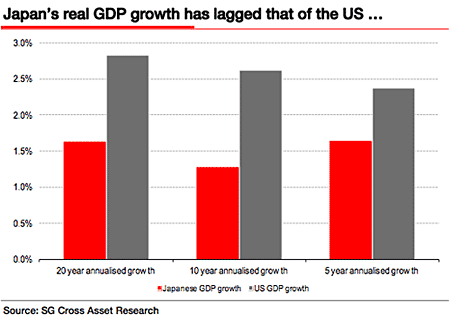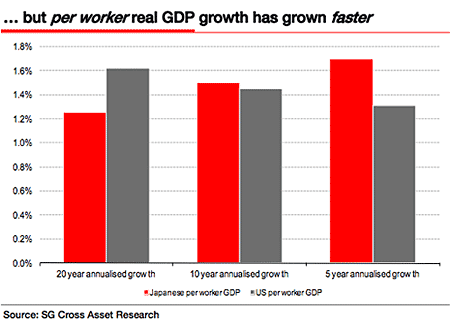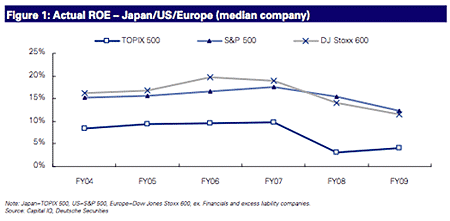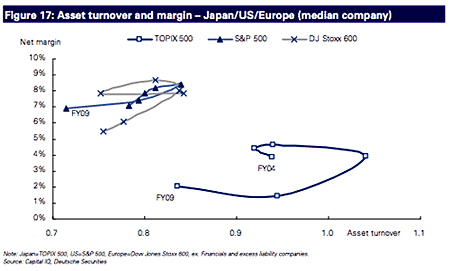Why a Japanese debt crisis could be good for stocks
Despite the image of Japan as a country stuck in an endless depression, it is still the world's third-largest economy and its economic performance has been better than many think. But stocks are still in the doldrums. So what will it take to get its stockmarket back on track? Cris Sholto Heaton explains.

Get the latest financial news, insights and expert analysis from our award-winning MoneyWeek team, to help you understand what really matters when it comes to your finances.
You are now subscribed
Your newsletter sign-up was successful
Want to add more newsletters?

Twice daily
MoneyWeek
Get the latest financial news, insights and expert analysis from our award-winning MoneyWeek team, to help you understand what really matters when it comes to your finances.

Four times a week
Look After My Bills
Sign up to our free money-saving newsletter, filled with the latest news and expert advice to help you find the best tips and deals for managing your bills. Start saving today!
It's hard to find much good news coming out of Japan these days. But at least the situation has avoided taking a further turn for the worse. Prime minister Naoto Kan has successfully seen off the first challenge to his leadership, after just three months in charge.
That's a relief. Not because Kan is proving a particularly impressive prime minister, but because his rival Ichiro Ozawa promised to make things even worse for the government. A long-time political heavyweight, he's unpopular with the public and represents what most voters rejected in the elections last year.
Kan probably won't be around for long, but he now has a shot at sorting out Japan's problems. He'll need all the luck he can get.
MoneyWeek
Subscribe to MoneyWeek today and get your first six magazine issues absolutely FREE

Sign up to Money Morning
Don't miss the latest investment and personal finances news, market analysis, plus money-saving tips with our free twice-daily newsletter
Don't miss the latest investment and personal finances news, market analysis, plus money-saving tips with our free twice-daily newsletter
The reality is that any true hope for change and for long-suffering investors in Japanese shares lies in the fact that matters could soon be out of Kan's hands
A most unusual depression
From an investor's point of view, it's sometimes not clear what Japan's problem is. The history is straightforward enough. There was an enormous debt-fuelled bubble in both equities and property at the end of the 1980s. That burst, leaving the banking system insolvent and many companies labouring under huge debts that they struggled for years to pay down. Growth has been sluggish and deflation is entrenched.
Yet the widespread image of Japan in depression seems misleading. It's still the world's third-largest economy. Most people enjoy a high standard of living. Crime is low, health standards and life expectancy high and unemployment limited (although there is a caveat to this, which I'll discuss later). It has many of the world's top companies and is a global leader in research and innovation in many areas.
And Japan's economic performance has been better than many think. Over the past decade, real GDP growth has been in line with that of Germany. And while GDP growth has lagged behind the US, for example, GDP growth per worker has actually been higher in Japan, as the charts below show.


Those charts come from Dylan Grice of Socit Gnrale, who backs the idea that Japan's apparent woes are related to its demographics. As he says: "Maybe Japan's macroeconomic malfunction has actually been a demographic compression, and maybe no particular policy fiscal or monetary, conventional or unconventional will 'normalise' Japan because Japan is actually already behaving perfectly normally. Maybe Japan is what economies which demographically peak look like."
Three things that need to change
I find this idea quite plausible. But just because Japan's demographics are troublesome, doesn't mean there's nothing else that needs to be fixed.
First, there's the ever-escalating government debt, now well over 200% of GDP in gross terms. In Japan's defence, this overstates the situation somewhat: Japan has more assets than most governments. And I believe that unlike most countries, Japan also doesn't net out debts from one part of the government to another in calculating gross debt. If you allow for these factors, then net debt to GDP is closer to countries such as Italy.
But that's still high and the budget deficit is persistently wide and interest payments swallow a growing share of revenues. Can an economy in which the government appears completely incapable of getting the public finances back under control really be deemed solid?
Second, shares and land prices have fallen steadily for the last two decades, hitting new lows in this cycle. The only assets that have done well are Japanese government bonds (JGBs), where yields fell below 1% again. This doesn't seem consistent with a robust economy.
Sure, demographics may play a part here as well. An ageing population and falling savings inflows should reduce demand for growth assets such as shares. But if Japanese assets looked genuinely attractive, foreign money might have flowed in and plugged the gap.
Third, the economy is suffering from persistent deflation in consumer prices and in salaries. The latter is much more important. Strong growth and falling consumer prices can coexist in a deflationary boom, which is good for almost everyone. But falling nominal salaries are not good news and point to weakness in the labour market.
And, while unemployment may be low, the labour market is not as healthy as it looks at first. The jobs of many younger workers are much less secure, with limited prospects for progression compared to older ones who started their careers before the bust. Some Japanese friends have told me that the low headline unemployment also disguises the fact that there is a lot of underemployment within their companies. Many Japanese firms feel a greater social responsibility than Western ones and dislike making permanent staff redundant, even if they have little for them to do.
There's no will to tackle the problem
Why do these problems exist? The answer probably isn't straightforward. If there was one tidy explanation, then Japan wouldn't be in the situation it's in. But from an investor's point of view, it may not matter. The details of the "why" can make an economist's career, but we're more interested in whether the situation will change or not.
I think there's a fair possibility that it will although it won't be by the actions of Kan or any other politician. Rather, change may be forced on Japan.
At the root of a possible shift, we have the problem of whether the government will succeed in getting the finances back under control. So far, they've show little sign of it. Had Ozawa taken over as prime minister, the answer would have been an even clearer no: as an old-school Japanese politician, he was firmly in favour of more spending.
Expert tips & advice for investing in Asia! Claim your FREE guides from MoneyWeek that include:
- How to go about investing to Asia
- Which brokers to use to buy foreign shares
Kan, who is more popular with the public, had made noises in favour on fiscal consolidation, but only weakly so. And the latest reports are that he's asked his cabinet to draw up a supplementary budget for this year with an additional stimulus package. In any case, as Ozawa's early challenge demonstrated, it's unlikely that Kan has the clout to push through big measures even if he wanted to.
In my view, the chances of Japan ever getting its finances back on track through tax rises and spending cuts seem very slim. The task would be vast, while the will seems non-existent. So what happens next?
Can Japan avoid monetising debt?
Japan's government has been able to continue funding its deficits because of deflation. Over 90% of Japanese government debt is held domestically. When consumer prices are falling steadily, those ever-lower yields still look like an attractive guaranteed return. But with demographics deteriorating, this ready market for JGBs will shrink. Ominously, the Government Pensions Investment Fund, which holds around 11% of government debt, became a net seller of JGBs over the last year for the first time in nine years.
Ultimately, I think it's likely that the government will have to push the Bank of Japan (BOJ) to buy up much larger volumes of bonds i.e. monetise its new debt issuance. The BOJ currently operates a self-imposed cap on JGB holdings, but is under pressure to lift this. Some politicians including Ozawa are calling for the law that makes the BOJ independent of government to be changed (in practice, the central bank's independence is already relatively weak).
This would be a dangerous route to go down, taking the government into Robert Mugabe school of economics territory. But it's unlikely to be alone in this among developed world governments over the next few years. And while monetising debt risks stirring inflation, that might not be a disaster in Japan's particular situation.
Indeed, one possible reason that Japan is still in deflation is that it didn't loosen monetary policy aggressively enough in the past. Conventional monetary policy is fairly impotent during the immediate aftermath of a debt bubble, as we've seen in the last few years. But large scale quantitative easing (QE) in recent years could perhaps have done something to shake off deflation.
The BOJ has been reluctant to go down that route. Its efforts at QE were fairly tentative and withdrawn quickly when inflation reemerged in 2006 and 2007. This caution is understandable, given its history: Japan tried QE in the 1930s and saw double-digit inflation return relatively quickly.
Large-scale debt monetisation and higher inflation could have unpleasant consequences. Policymakers in Japan and elsewhere face a dangerous balancing act if they go down this route. But I think it's entirely plausible that they'll have no choice.
Inflation could be good for stocks
Even moderate inflation would make JGBs unattractive. Demand would fall and that would push up bond yields although ongoing BOJ buying might partly offset that. But it should make equities and real estate appealing again, since these assets have some protection again inflation, leading investors to switch back into them. So, strangely enough, an orderly deterioration of the Japanese government's ability to fund itself might be what we need to bring an end to the long equity bear market.
From an investor's point of view, this does not solve all issues with the Japanese market. The poor performance of Japanese equities doesn't just reflect deflation and investors' preference for the low but certain return on bonds. Japanese companies have low levels of profitability compared to those in other developed markets, as the chart below shows.

This could be tied to a combination of overinvestment and deflation: high fixed costs, overcapacity and weak demand at a time of falling output prices will obviously lead to poor profitability. In that case, inflation would also help to improve profitability, giving equity investors an extra boost on top of greater demand for shares.
But it doesn't seem to be whole story. Japanese firms also tend to suffer from weak pricing power or insufficient attention to pricing strategy, argues Naoki Kamiyama of Deutsche Bank. As the chart below shows, they tend to have higher asset turnover (sales divided by assets) and lower margins than in the US and Europe. This is probably a fundamental problem of corporate strategy that won't be fixed by the end of deflation alone.

And the problems spread further than this. Corporate Japan suffers from extensive cross-shareholdings, low dividend payouts and a general lack of concern for shareholders. It's for these reasons that I don't consider Japan exceptionally cheap as it stands.
The Topix may be on a price/book of 1.03, but it extracts less value from those assets for shareholders than companies in many other markets. Japan is only cheap if there is restructuring to boost profitability and treat shareholders better. Many of us been waiting for this for a while and we continue to be disappointed.
As I noted a couple of weeks ago, Japanese shares have performed very poorly this year. My view is that they will probably continue to struggle, while deflation remains a problem.

I continue to hold Japanese stocks in a pension fund, but I'm not adding to them at the moment. However, if we see signs of inflation returning, they could become interesting again. If we see some corporate culture changing, they could do even better.
Right now, the latter looks too much to expect. But inflation could easily be on the cards as the government runs out of options. I certainly wouldn't buy into this story yet but it's one to keep an eye on.
This article is from MoneyWeek Asia, a FREE weekly email of investment ideas and news every Monday from MoneyWeek magazine, covering the world's fastest-developing and most exciting region. Sign up to MoneyWeek Asia here
Get the latest financial news, insights and expert analysis from our award-winning MoneyWeek team, to help you understand what really matters when it comes to your finances.

Cris Sholt Heaton is the contributing editor for MoneyWeek.
He is an investment analyst and writer who has been contributing to MoneyWeek since 2006 and was managing editor of the magazine between 2016 and 2018. He is experienced in covering international investing, believing many investors still focus too much on their home markets and that it pays to take advantage of all the opportunities the world offers.
He often writes about Asian equities, international income and global asset allocation.
-
 New PM Sanae Takaichi has a mandate and a plan to boost Japan's economy
New PM Sanae Takaichi has a mandate and a plan to boost Japan's economyOpinion Markets applauded new prime minister Sanae Takaichi’s victory – and Japan's economy and stockmarket have further to climb, says Merryn Somerset Webb
-
 Plan 2 student loans: a tax on aspiration?
Plan 2 student loans: a tax on aspiration?The Plan 2 student loan system is not only unfair, but introduces perverse incentives that act as a brake on growth and productivity. Change is overdue, says Simon Wilson